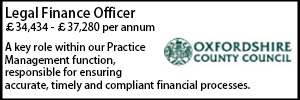SRA issues report on opportunities and risks of AI
- Details
The Solicitors Regulation Authority has set out its views on the opportunities – and risks – presented by artificial intelligence (AI).
The SRA’s latest Risk Outlook outlines current and potential future developments, “and what firms may need to think about in each area to help them assess if and how they might be affected”.
The regulatory identifies opportunities such as using AI to complete administrative tasks more efficiently, so as to free up staff capacity for more complex tasks. “Automation can reduce costs – it could be used, for instance, to capture client information before a first consultation.”
The SRA also pointed out that firms may already have access to software, which can help them harness AI and develop new ways of working.
Among the risks the profession should consider are:
- Accuracy and bias problems – “these can cause AI to produce incorrect and possibly harmful results, either through hallucinations or amplification of existing bias in the data. These effects can have the added problem that people often put more trust in computers than in humans.”
- Client confidentiality – “maintaining client confidentiality when using AI, not just protecting against exposure to third parties but also making sure sensitive information is secure both in their firm and when dealing with the system provider.”
- Accountability – “solicitors need to remember that they are still accountable to clients for the services provided, whether or not external AI is used.”
The RIsk Outlook noted that the use of AI is "rising rapidly", citing reports that:
- Three quarters of the largest solicitors' firms were using AI, nearly twice the number from just three years ago;
- Over 60% of large law firms were at least exploring the potential of the new generative systems, as were a third of small firms.
The SRA said it intends to retain "an open mind" on the systems used, balancing protections for consumers with support for innovation, adding that it will produce guidance on specific issues as they come up.
Paul Philip, SRA Chief Executive, said: “It is difficult to predict how quickly AI will change the legal sector, but increasingly we won’t be able to ignore its impacts.
“So far it has mainly been larger firms using AI. However, with such technology becoming increasingly accessible, all firms can take advantage of its potential. There are opportunities to work more efficiently and effectively. This could ultimately help the public access legal services in different and more affordable ways.
“Yet there are risks. Firms need to make sure they understand and mitigate against them – just as a solicitor should always appropriately supervise a more junior employee, they should be overseeing the use of AI. They must make sure AI is helping them deliver legal services to the high standards their clients expect.”
The SRA’s Risk Outlook includes a summary of what the regulator says are the key things firms should be considering before using AI.
Head of Legal
Commercial Lawyer
Legal Director - Government and Public Sector
Child Care Lawyer
Locum roles
 Data Controller, Processor or Joint Controller: What am I? - Act Now
Data Controller, Processor or Joint Controller: What am I? - Act Now
18-02-2026 10:00 am
Online (live)
 Freedom of thought, belief and religion: Article 9 ECHR - Francis Taylor Building
Freedom of thought, belief and religion: Article 9 ECHR - Francis Taylor Building
19-02-2026
Online (live)
 AI and Information Governance: Bridging Innovation and Compliance - Act Now
AI and Information Governance: Bridging Innovation and Compliance - Act Now
19-02-2026 10:00 am
Online (live)
 Safeguarding Issues and Fairness in Investigations and Hearings - 3PB
Safeguarding Issues and Fairness in Investigations and Hearings - 3PB
24-02-2026 11:00 am
Online (live)
 Children and Young People (DoL, Competency and Capacity) - Peter Edwards Law Training
Children and Young People (DoL, Competency and Capacity) - Peter Edwards Law Training
25-02-2026
Online (live)
 Court of Protection Property and Financial Affairs Webinar Series: Contested Statutory Will Application - 39 Essex Chambers
Court of Protection Property and Financial Affairs Webinar Series: Contested Statutory Will Application - 39 Essex Chambers
02-03-2026
Online (live)
 Housing and Homelessness Conference - Birmingham 2026 - 4-5 Gray's Inn Square
Housing and Homelessness Conference - Birmingham 2026 - 4-5 Gray's Inn Square
03-03-2026 9:30 am
East Midlands
 Law Enforcement Data Processing and Part 3 of the DPA 2018 - Act Now
Law Enforcement Data Processing and Part 3 of the DPA 2018 - Act Now
05-03-2026 10:00 am
Online (live)
 Cross-Border Placements of Children - Justin Gray, Trinity Chambers
Cross-Border Placements of Children - Justin Gray, Trinity Chambers
05-03-2026 3:00 pm
Online (live)
 Grappling with S73 - variations of conditions applications or appeals - Ivy Legal
Grappling with S73 - variations of conditions applications or appeals - Ivy Legal
09-03-2026
Online (live)




















































































































 The Procurement Act - One Year On - DWF
The Procurement Act - One Year On - DWF  The ERA – An Overview - Sharpe Pritchard
The ERA – An Overview - Sharpe Pritchard  Roundtable Event: Risks arising from Inquests and Legal Update - Devonshires
Roundtable Event: Risks arising from Inquests and Legal Update - Devonshires  The General Data Protection Regulation - Act Now
The General Data Protection Regulation - Act Now 